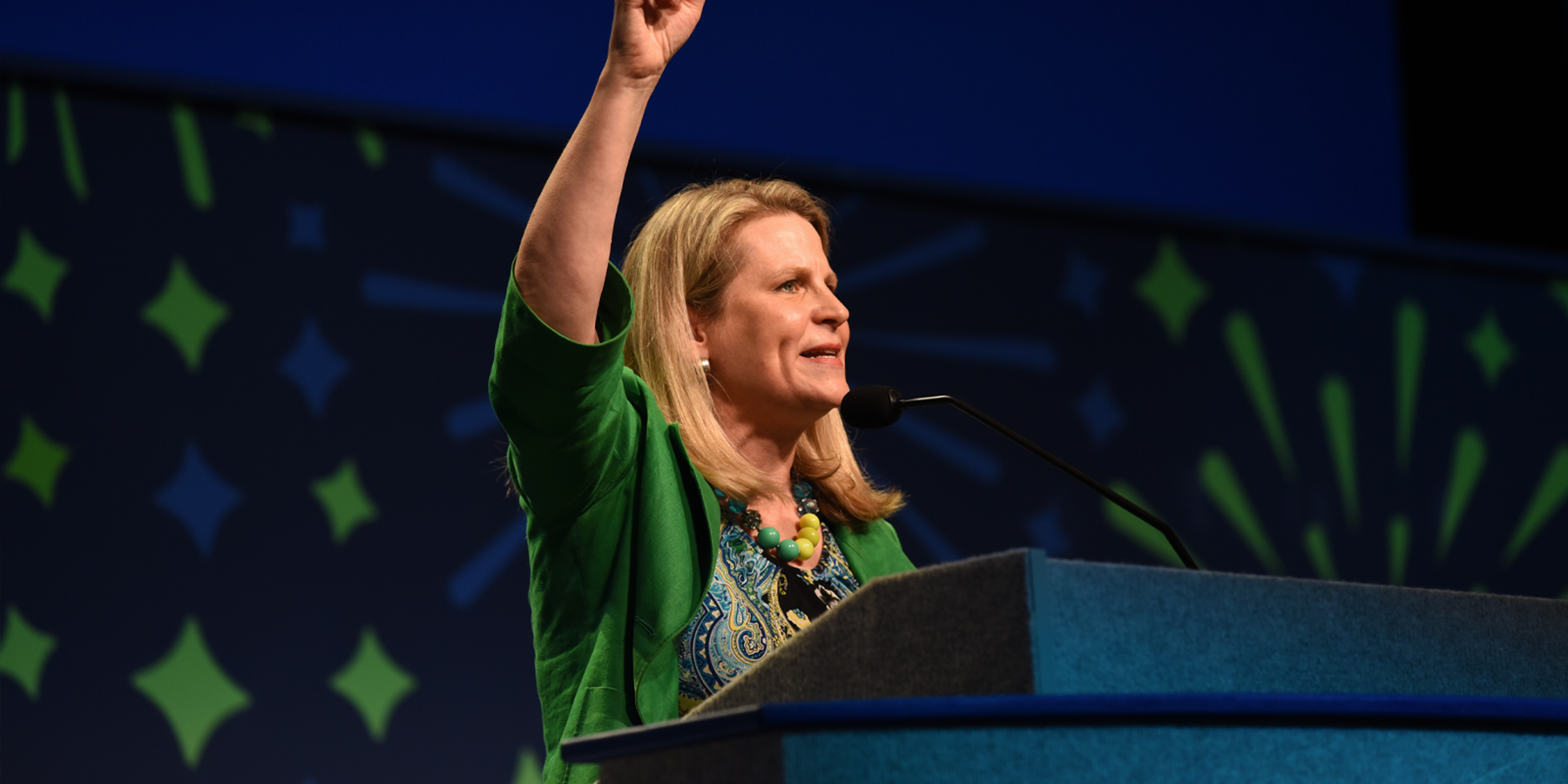The nation’s top labor leader addressed the 45th AFSCME International Convention on Wednesday.
Liz Shuler, president of the AFL-CIO, began her address to Convention attendees by recognizing the contributions of AFSCME President Emeritus Jerry McEntee, who died on Sunday.
“President McEntee knew the power of organizing and used it to turn AFSCME into the political powerhouse it is today,” said Shuler. “I know that we will all continue to honor his legacy by living out his values – organizing, mobilizing, and building a better future.”
Shuler made history this year by being elected the first woman to lead the AFL-CIO. She has been at the helm of the labor federation since the passing of Richard Trumka in 2021.
Previously the AFL-CIO’s secretary-treasurer, Shuler has been breaking glass ceilings for women in the labor movement after making it her life’s mission to advocate for workers and working families.
In 2009, she became the first woman elected secretary-treasurer of the AFL-CIO and the youngest woman ever on the federation’s Executive Council. In that position, she turned deficits into surpluses and steered the federation through multiple fiscal crises, including the COVID-19 pandemic.
On Wednesday, Shuler described a bright future for the labor movement, a future that crystallized for her weeks ago at the AFL-CIO convention in Philadelphia and at a rally at the Philadelphia Museum of Art to support AFSCME Local 379 museum workers.
“When I looked across those famous Rocky steps, I saw the whole story of where we are as a movement,” Shuler said. “We are not only organizing in new places like museums and cultural institutions, we’re leveraging the power of our entire federation – our internationals, our locals, our state federations and our local labor bodies – to do it.
“There’s not a day that goes by when I don’t hear a story about people organizing in a new place. There are so many people taking action everywhere: at breweries and coffee shops, REI and Apple Stores, stadiums and hospitals, universities and museums, and even in the cannabis industry and on Capitol Hill,” she added.
Shuler grew up in a union household. Her father, Lance, was a power lineman and longtime member of International Brotherhood of Electrical Workers (IBEW), Local 125 at Portland General Electric, while her late mother, Joyce, worked as an estimator in the company’s service and design department.
In 1993, she started working at Local 125, where she helped the clerical workers organize. When energy giant Enron Corp. tried to push electricity deregulation through the Oregon legislature, she worked with a coalition of labor, community and environmental activists to challenge and ultimately overcome Enron’s powerhouse lobbying campaign.
In subsequent years, she worked her way up the ranks of IBEW to become an assistant to the president.
Shuler also described a path forward in which workers come together to “shape a high road” for the nation.
“Whether it’s new technology, or the climate crisis, the labor movement can use our power to shape a high road, high-wage future. We know it’s possible,” said Shuler. “And we’re going to make sure that environmental justice communities and communities of color who have been disproportionately harmed by pollution are part of these solutions – because we know there is no racial justice without the economic justice that access the high road jobs these projects will create.”
Shuler also credited the AFSCME Strong organizing model with placing organizing at the centerpiece of union-building and fostering powerful relationships with union members.
“You connected with people at the worksite, at home, on the phone and in the community. And most importantly, you listened,” said Shuler. “You asked people what they care about, about the struggles their families were facing, and you found common ground. Then you used that bond to take that next step of speaking truth to power. And it worked.”
She said a similar model will be deployed by the AFL-CIO's Labor 2022 plan.
“I know there’s a lot of skepticism that any of this can be done, skepticism that we can break through the noise, skepticism that we can preserve our pro-worker majority,” said Shuler. “But we don’t have to buy into that narrative – and I’ll tell you: if we do buy into it, that will guarantee it becomes reality. So let’s think differently. Let’s do what unions do - join together and fight.”
